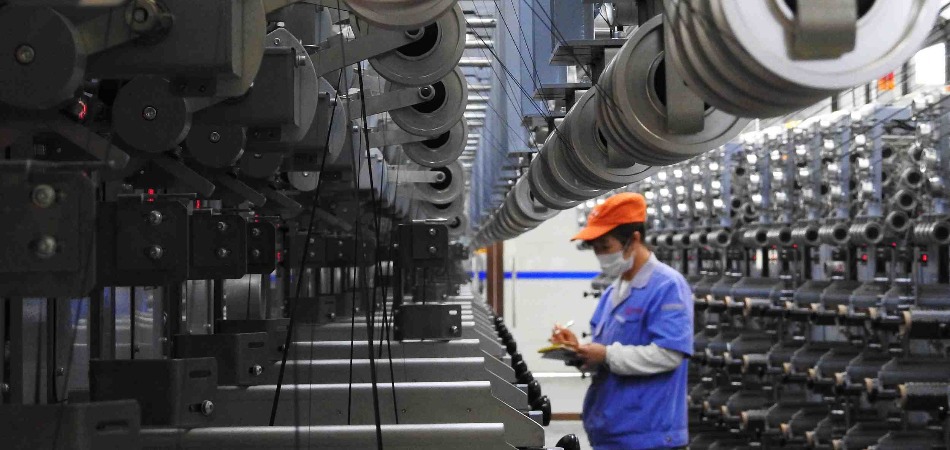British jobs data strengthens rate hike prospect

By MG News | March 21, 2018 at 10:24 PM GMT+05:00
AFP/APP - British wages growth is catching up with overall inflation and UK unemployment has hit a 1975 low, official data showed Wednesday, increasing expectations of an interest rate hike, analysts said.
The data, published on the eve of the Bank of England's latest monetary policy decision, helped push the pound back above $1.40 as it recovers from a Brexit-fueled slump.
However it was accompanied by gloomier news from Britain's struggling retail sector.
Average weekly earnings growth, excluding bonuses, accelerated to 2.6 percent in the three months to January compared with a year earlier, the Office for National Statistics (ONS) revealed.
That followed 2.5-percent expansion in the three months to December. Nevertheless, wages growth is still lagging annual inflation which stood at 2.7 percent last month.
The combination of rising wages and slowing overall inflation means that many Britons will have more cash in their pockets.
Owing to the pick-up in wages growth, markets expect the Bank of England (BoE) to deliver a quarter-point rise to its main interest rate.
But it won't occur at this week's meeting, analysts said. Rather the BoE is set to raise borrowing costs to 0.75 percent at its May gathering.
Laying ground for hike
EY ITEM Club economist Howard Archer said he expected the BoE to use this week's "meeting to lay the ground for a May rate hike".
Britain's annual inflation rate slowed to 2.7 percent in February from 3.0 percent in January, as food and transport costs rose by less than one year ago, ONS data showed Tuesday.
"Wage growth still is not quite beating inflation, but both pay and prices now appear to be moving in the right direction for UK consumers," said Laith Khalaf, analyst at stockbrokers Hargreaves Lansdown.
Inflation had jumped last year and remains at an elevated level after Britain voted to leave the European Union in 2016. The Brexit referendum pushed down the pound, in turn hiking the cost of imported goods.
The ONS on Wednesday added that Britain's jobless rate -- or the proportion of the workforce that is unemployed -- stood at 4.3 percent in the three months to the end of January.
That was slightly down from 4.4 percent in the quarter to December 2017, which had been the first increase in 16 months.
Wednesday's data "will come as a huge relief to the consumer who has suffered months and months of elevated inflation and falling wages in real terms", said City Index analyst Fiona Cincotta.
"The easing of pressure on households as they no longer experience falling wages in real terms should, in theory encourage more spending on non-essential items, something which had declined dramatically across the end of last year and the beginning of this year.
"Suddenly the return of 'good' inflation is a real probability, as opposed to the 'bad' pound-induced inflation which has plagued the UK since the Brexit referendum," she added.
Related News
| Name | Price/Vol | %Chg/NChg |
|---|---|---|
| KSE100 | 131,949.07 198.95M |
0.97% 1262.41 |
| ALLSHR | 82,069.26 730.83M |
0.94% 764.01 |
| KSE30 | 40,387.76 80.88M |
1.11% 442.31 |
| KMI30 | 191,376.82 77.76M |
0.36% 678.77 |
| KMIALLSHR | 55,193.97 350.11M |
0.22% 119.82 |
| BKTi | 35,828.25 28.42M |
3.64% 1259.85 |
| OGTi | 28,446.34 6.84M |
-1.02% -293.01 |
| Symbol | Bid/Ask | High/Low |
|---|
| Name | Last | High/Low | Chg/%Chg |
|---|---|---|---|
| BITCOIN FUTURES | 108,125.00 | 110,525.00 107,865.00 |
-2290.00 -2.07% |
| BRENT CRUDE | 68.51 | 68.89 67.75 |
-0.29 -0.42% |
| RICHARDS BAY COAL MONTHLY | 97.50 | 0.00 0.00 |
0.75 0.78% |
| ROTTERDAM COAL MONTHLY | 106.00 | 106.00 105.85 |
-2.20 -2.03% |
| USD RBD PALM OLEIN | 998.50 | 998.50 998.50 |
0.00 0.00% |
| CRUDE OIL - WTI | 66.50 | 67.18 66.04 |
-0.50 -0.75% |
| SUGAR #11 WORLD | 16.37 | 16.40 15.44 |
0.79 5.07% |
Chart of the Day
Latest News
Top 5 things to watch in this week
Pakistan Stock Movers
| Name | Last | Chg/%Chg |
|---|
| Name | Last | Chg/%Chg |
|---|




 Central Government Debt
Central Government Debt
 CPI
CPI